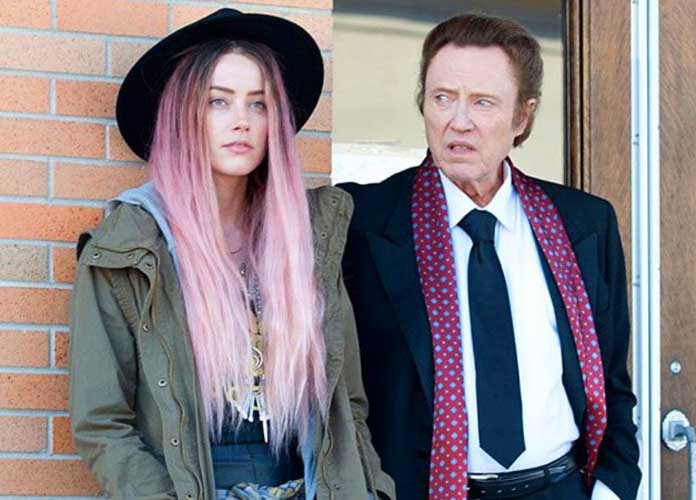‘One More Time’ Movie Review: An Anticlimactic Film On A Well-Worn Topic

2/5
One More Time follows young lost musician, Jude (Amber Heard), who is stuck with unfinished songs and singing jingles for radios. The film centers around her forced return home (due to an apartment eviction) where she must face tension between her tense family. Specifically, she must deal with her father, Paul Lombard (Christopher Walken), a man who is “considered by many one of the best romantic crooners of all time.” Along with her father, whom she calls “Paul,” there’s her seemingly perfect sister, Corrine (Kelli Garner), her ex-boyfriend brother-in-law Tim (Hamish Linklater), her nephew David, and her most recent step mother Lucille (or as Corrine and Jude like to call her “Lucifer,” played by Ann Magnuson).
Almost as soon as Jude returns home, Paul announces that he’s making a comeback (another one) and has written a song. Everyone is shocked, because he’s not a songwriter. But, not wanting to harm his fragile ego, they express their excitement, even when he books a show to premiere the single as an opener for rock band The Flaming Lips, which Jude knows will make him a joke. Jude, however, has other things to worry about, and the problems and tensions that the film builds around Jude initially are substantial and believable. The jealousy, the resentment, the fear of failure—it’s all warranted as the film explores her relationship with her home life and expands on her childhood. Jude is someone who warrants the kind of instability that she has exuded in her life.
She says as much too, multiple times, which is one of the primary problems of the film. The crux of the film seems to be that Jude has all these problems because of, mainly, her father’s actions. She is childish and reckless because her father is the same. Yet her father points out he did not do the same things to Corrine.
Well, almost. Corrine is just as aware of her father’s harmful effects on her life as Jude is. It seems because she is not a talented singer her father put less pressure on her, and thus gave her less attention. This is Corrine’s side of the resentment, and a fairly heartbreaking one as well, allowing Garner to give a commendable performance of a woman who has tried so hard to counteract the mistreatment of her father by building a life for herself but cannot fully hide her lasting pain, no matter how much she would like to.
This doesn’t change the issue of Jude’s behavior. It doesn’t seem that Jude has just come to this realization that her feelings towards her father have caused a lot of her own problems, and it seems the turning point of the film is when she realizes no matter what she believes of her father, it is upon herself to grow up. She, as her father points out in one of their arguments, is an adult. It’s very unclear how no one had made this point to her earlier in her life as the dipped-dyed plaid-wearing rocker may have looked like she was in her early twenties, but was revealed to be thirty already.
Furthermore, all the tension that is built at the beginning of the film, never really bubbles to the surface. It all figures itself out one way or another, either directly or indirectly. Maybe something can be said for the maturity of letting go of unimportant problems, but this causes the film to have very little effect on viewers. Aside from Jude’s final decision to essentially get on with her life, there is no revelation or character growth. It seems that the whole film just slowly opens up the problems of the Lombard household up until the very end and does very little with them.
This is not for trying on the actors’ side. Besides Garner’s striking performance, Walken presents a Paul Lombard with distinct love for his family buried under his own selfishness and bitterness. Furthermore, Linklater’s portrayal of Tim is endearing as well as subtly melancholy, adding needed dimension in a dialogically submissive and stagnant character.
Robert Edwards‘ One More Time has a promising premise but ultimately offers very little to the well-worn topic of the effects of famous parents on their children and the weathered tales of the struggles of both the talented, unconfident newbie and the nostalgic, washed up oldie. The film seems to present the uncovering of the conflicts of a believable but ultimately unsurprising family as its purpose, causing One More Time to be anticlimactic and ineffectual.
RELATED ARTICLES
Get the most-revealing celebrity conversations with the uInterview podcast!

 Click here for the Oscars 2016: Best Dressed Photos Slideshow
Click here for the Oscars 2016: Best Dressed Photos Slideshow



Leave a comment